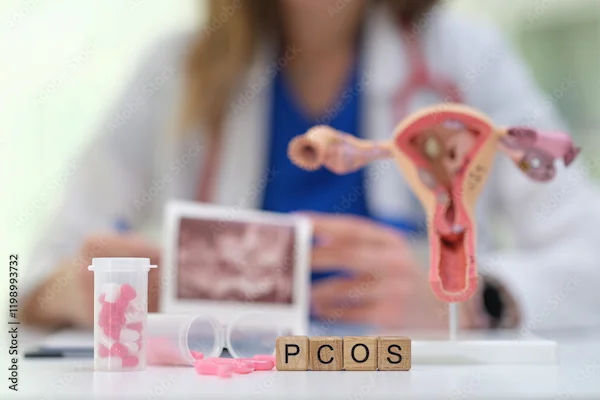PCOS and Pregnancy: Understanding the Issues
Know the relation between PCOS and pregnancy, how it affects pregnancy, symptoms, pregnancy care and improving fertility with PCOS.


Introduction
Polycystic Ovary Syndrome (PCOS) is a common hormonal disorder that affects many women, especially during their reproductive years. If you have PCOS and are planning to conceive or are already pregnant, you may have concerns about how this condition affects your fertility and pregnancy journey. The good news is that with the right knowledge and care, many women with PCOS can have healthy pregnancies.
In this article, we’ll explore the connection between PCOS and pregnancy, common challenges, and ways to manage them effectively.
How Does PCOS Affect Pregnancy?
PCOS can make getting pregnant more difficult because it often leads to irregular or absent ovulation (the release of an egg from the ovary). Without regular ovulation, conception becomes harder. Additionally, PCOS is linked to hormonal imbalances, such as high levels of insulin and androgens (male hormones), which can further interfere with fertility.
Once pregnant, women with PCOS may face a higher risk of certain complications, including:
Miscarriage – Due to hormonal imbalances and insulin resistance.
Gestational diabetes – A temporary form of diabetes during pregnancy.
High blood pressure (preeclampsia) – A serious condition that can affect both mother and baby.
Premature birth – Delivery before 37 weeks of pregnancy.
C-section delivery – Due to complications like large baby size or labor difficulties.
While these risks sound concerning, proper medical care and lifestyle adjustments can significantly reduce them.
Consult a top gynaecology specialist for the best advice
Symptoms of PCOS That May Affect Pregnancy
If you have PCOS, you may already be familiar with symptoms like:
Irregular or missed periods
Excess facial or body hair (hirsutism)
Acne or oily skin
Weight gain or difficulty losing weight
Thinning hair on the scalp
These symptoms are caused by hormonal imbalances, which can also impact fertility. If you’re trying to conceive, tracking your menstrual cycle and ovulation becomes essential.
Improving Fertility with PCOS
If you have PCOS and want to get pregnant, here are some steps you can take:
1. Consult a Doctor
A gynecologist or fertility specialist can help assess your condition and suggest treatments like:
Ovulation induction (medications like Clomiphene or Letrozole to stimulate egg release).
Metformin (to improve insulin resistance and regulate cycles).
In vitro fertilization (IVF) (if other treatments don’t work).
2. Maintain a Healthy Weight
Weight management is crucial because excess weight worsens insulin resistance and hormonal imbalances. Even a 5-10% weight loss can improve ovulation and fertility.
3. Eat a Balanced Diet
Focus on:
Low-glycemic foods (whole grains, vegetables, lean proteins).
Healthy fats (avocados, nuts, olive oil).
Fiber-rich foods (fruits, legumes, oats).
Avoid sugary and processed foods that spike insulin levels.
4. Exercise Regularly
Moderate exercise (like walking, yoga, or swimming) helps regulate hormones and improve insulin sensitivity.
5. Track Ovulation
Use ovulation predictor kits or fertility apps to identify your fertile window.
6. Manage Stress
High stress affects hormones. Practices like meditation, deep breathing, and adequate sleep can help.
Pregnancy Care for Women with PCOS
If you conceive with PCOS, extra care is needed to ensure a healthy pregnancy:
1. Early Prenatal Visits
Regular check-ups help monitor blood sugar, blood pressure, and baby’s growth.
2. Monitor for Gestational Diabetes
Your doctor may recommend glucose tests early in pregnancy.
3. Stay Active
Gentle exercises (approved by your doctor) can help manage weight and reduce complications.
4. Eat Nutrient-Rich Foods
Focus on protein, iron, folate, and omega-3s to support your baby’s development.
5. Take Prenatal Vitamins
Folic acid is especially important to prevent birth defects.
When to Seek Help?
If you have PCOS and:
Have been trying to conceive for over a year (or 6 months if you’re over 35) without success.
Experience very irregular or absent periods.
Have uncontrolled weight gain or insulin resistance.
It’s time to consult a specialist.
Final Thoughts
PCOS can make pregnancy more challenging, but it doesn’t mean you can’t have a healthy baby. With proper medical guidance, lifestyle changes, and early prenatal care, many women with PCOS successfully conceive and deliver healthy children.
Consult a top gynaecology specialist for the best advice
Consult a top gynaecology specialist for the best advice

Dr. Mona Yadav
Obstetrician and Gynaecologist
19 Years • MBBS, MD (Obstetrics & Gynaecology)
Dombivli
Nulife multispeciality, Dombivli

Dr. Asha Rani Singh
Obstetrician and Gynaecologist
24 Years • MBBS DGO
Delhi
Dr Asha Rani Singh Clinic, Delhi

Dr. Parul Sharma
Obstetrician and Gynaecologist
8 Years • MBBS, MS (Obstetrics & Gynaecology)
New Delhi
THE DOCTORS NESST, New Delhi
Dr. K Anusha
Obstetrician and Gynaecologist
4 Years • MBBS, DGO
Yemmiganur
SRINIVASAA HOSPITAL, Yemmiganur

Dr. Tuhin Dutta
Obstetrician and Gynaecologist
15 Years • MBBS , DGO (Obstetrics & Gynaecology)
Kolkata
BIENETRE CLINIC, Kolkata

